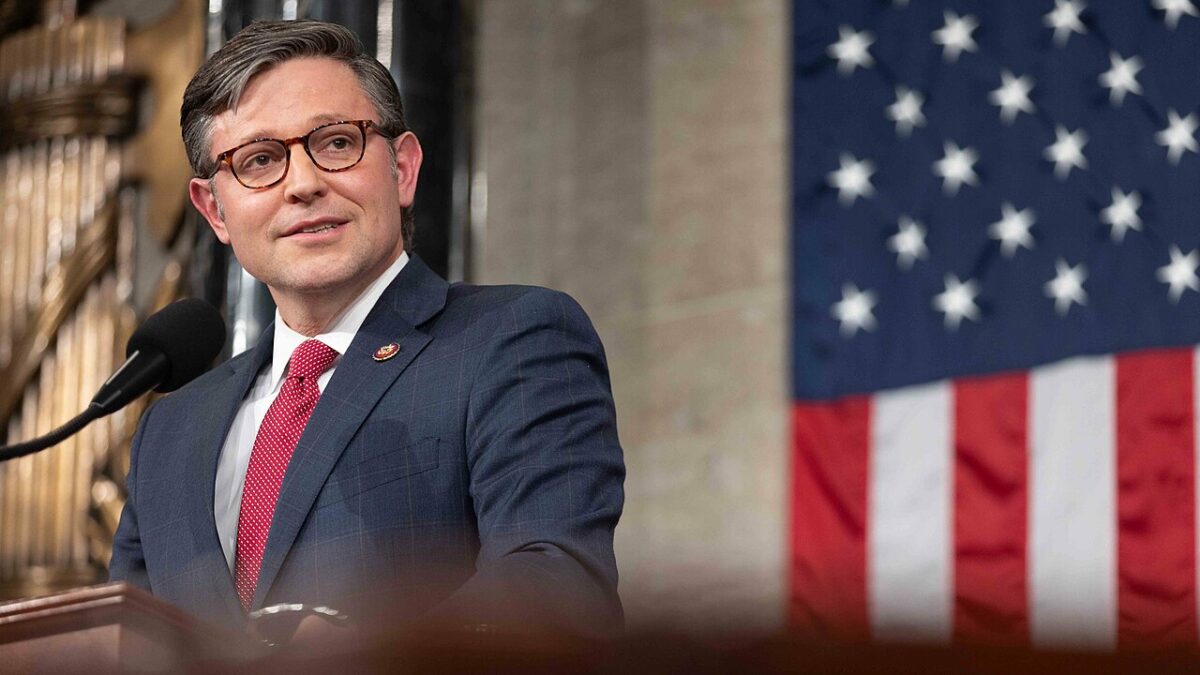With “friends” like Mike Johnson, do conservatives really need enemies?
That question, harsh as it sounds, should echo in the minds of individuals and groups who want to restrain Washington’s inflation-causing spending. The agreement House Speaker Johnson cut with Democrats over the weekend would actually raise spending compared to what would happen under the status quo. That additional spending binge might constitute the kind of change Democrats believe in, but it shouldn’t persuade fellow Republicans to sign off on this ill-conceived plan.
Debt Deal’s Spending Caps
Almost eight months ago, I wrote about how the debt limit agreement then-Speaker Kevin McCarthy, R-Calif., negotiated with Democrats virtually guaranteed another massive omnibus spending bill. As part of that argument, I noted that the debt limit deal contained provisions triggering automatic changes in spending levels should Congress not pass all 12 of its annual appropriations measures.
Back in May, those changes meant that “spending on defense programs — which Republicans generally support — will decrease, while spending on non-defense programs will actually increase when compared to the underlying spending targets laid out in the debt limit bill” (emphasis original). I argued in May that Republican “defense hawks” would push for an omnibus to avoid those automatic cuts, and Democrats would likewise have leverage to demand a bloated omnibus spending bill, because doing nothing would otherwise result in two outcomes they largely support — lower defense spending and higher non-defense spending.
But the dynamic changed substantially in the months since, in a way that gives Republicans additional leverage. The Congressional Budget Office (CBO) reestimated the spending caps due to budgetary “anomalies” and other technical changes. (Wonky details are available in this article.)
The end result of the CBO reestimate? If the debt deal’s spending caps kick in, non-defense spending would decrease significantly, while defense spending would get held largely flat. In other words, conservatives have significant leverage to demand spending concessions from Democrats, because the status quo under current law would result in an outcome most conservatives would support.
Shady ‘Side Deal’
Given that dynamic, what did Speaker Johnson and Republican “leadership” do? By and large, they bailed the Democrats out of the predicament they put themselves in last May.
Johnson’s office has framed the agreement as one that “represents an actual cut in non-VA, non-defense spending.” But Johnson’s statement leaves unanswered a key question: a “cut” compared to what?
Relative to spending levels in the fiscal year that concluded last Sept. 30, non-defense spending might decline by a nominal amount. But an increase in defense spending means that overall spending will still trend higher than the bloated budget passed late in 2022 under former Speaker Nancy Pelosi, D-Calif.
More importantly, relative to the caps that are in current law and will take effect in a few months should Congress not pass 12 appropriations bills, spending will increase, and increase substantially. My friend Rep. Chip Roy, R-Texas, has a good chart that shows the difference:
The difference between the yellow line, overall spending levels if the caps in May’s debt deal take effect, and the red line in this weekend’s agreement amounts to the additional spending Johnson agreed to. Even by Washington standards, that roughly $100 billion difference amounts to real money.
That difference in spending arises because Johnson agreed to maintain a “side deal” arrangement negotiated between McCarthy and Biden last spring to increase non-defense spending. He did so even though this “deal” was not written anywhere in law, such that neither he (who wasn’t in the room when it was negotiated) nor anyone else actually voted to support it last spring.
Johnson did receive some minor concessions that modified this “side deal.” Specifically, more of the spending in this agreement was paid for by rescinding unspent Covid money and an additional $10 billion in IRS funding that Democrats passed in the Inflation (Reduction) Act in 2022.
But rescinding Covid money that wasn’t going to be spent anyway amounts to little more than putting lipstick on a pig. Johnson had every bit of leverage to demand that the spending reductions already scheduled to take place actually go into effect — or force the Democrats into a “shutdown showdown” over their desire to spend, spend, spend. Instead, he caved like a cheap suit.
But Wait — There’s More!
As if the speaker’s failure to use his leverage on spending weren’t bad enough, Johnson also conceded late last week that he would not insist on border security provisions being added to the annual spending bills. As a result, Johnson and any other Republican who votes for these spending measures will continue to fund the Biden administration’s fecklessness at the border.
And lest one think that the humiliation was not total, Sen. Mitch McConnell, R-Ky., among others, have publicly stated that “obviously” Congress will have to pass at least one more short-term continuing resolution to allow lawmakers to draft specifics of the spending agreement into law. Recall that Johnson publicly committed last year that he was “done” with more short-term spending bills. So much for that promise.
However, there still is another way. Johnson can — and should — put a continuing resolution on the floor. But this one should fund the entire government at current spending levels through Sept. 30, the end of the fiscal year. Passing this type of continuing resolution would allow the spending cuts included in the debt limit bill to take effect — i.e., the outcome Johnson claims to support.
If Democrats want to filibuster that continuing resolution in the Senate, i.e., shut down the government because they want to bust through the spending caps negotiated not nine months ago, then let them. Republican “leaders” should stop trying to beat the Democrats at their own big-spending game.








